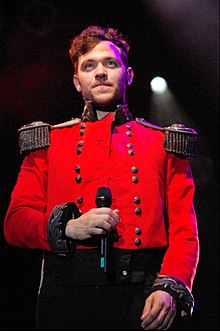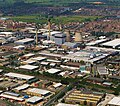Portal:Berkshire
Welcome to the Berkshire portal

The Royal County of Berkshire, commonly known as simply Berkshire (/ˈbɑːrkʃɪər, -ʃər/ ⓘ BARK-sheer, -shər; abbreviated Berks.), is a ceremonial county in South East England. It is bordered by Oxfordshire to the north, Buckinghamshire to the north-east, Greater London to the east, Surrey to the south-east, Hampshire to the south, and Wiltshire to the west. Reading is the largest settlement and the county town.
The county has an area of 1,263 km2 (488 sq mi) and a population of 911,403. The latter is concentrated in the east, the area closest to Greater London, and includes the county's largest towns: Reading (174,224) Slough (164,793), Bracknell (113,205), and Maidenhead (70,374). The west is rural, and its largest town is Newbury (33,841). For local government purposes Berkshire comprises six unitary authority areas: Bracknell Forest, Reading, Slough, West Berkshire, Windsor and Maidenhead, and Wokingham. The historic county included the parts of Oxfordshire south of the River Thames, which formed its northern border, but excluded Caversham and Slough.
The Berkshire Downs, a chalk downland and area of outstanding natural beauty, occupy the west of the county. They are the source of the River Kennet, which flows east through Newbury before meeting the Thames at Reading. The Thames then forms Berkshire's northern border, flowing past Maidenhead, before entering the county and flowing past Slough and Windsor. The south-east of the county contains Swinley Forest, a remnant of Windsor Forest now used as a forestry plantation.
There is evidence of prehistoric settlement on the Berkshire Downs, including the Iron Age Uffington White Horse, now in Oxfordshire. In the Anglo-Saxon period the region was contested by Mercia and Wessex, and Alfred the Great was born in Wantage, also now in Oxfordshire. Windsor Castle, which would become the official country residence of the British monarch, was built after the Norman Conquest. The county has been the site of several battles, particularly during the First English Civil War, when Reading and Wallingford were besieged two battles took place at Newbury, in 1643 and 1644. The proximity of the east of the county to London led to development from the nineteenth century, when Slough became an industrial centre and Bracknell was designated a new town. Software development and high-tech industry dominate the economy in the east, but the west remains an agricultural region. (Full article...)
Selected article
Reading (/ˈrɛdɪŋ/ ⓘ RED-ing) is a town and borough in Berkshire, England. Most of its built-up area lies within the Borough of Reading, although some outer suburbs are parts of neighbouring unitary authority areas. Located in the Thames Valley at the confluence of the rivers Thames and Kennet, Reading is 40 miles (64 km) east of Swindon, 25 miles (40 km) south of Oxford, 40 miles (64 km) west of London and 16 miles (26 km) north of Basingstoke.
Reading is a major commercial centre, especially for information technology and insurance. It is also a regional retail centre, serving a large area of the Thames Valley with its shopping centres, including the Oracle, the Broad Street Mall, and the pedestrianised area around Broad Street. It is home to the University of Reading. Every year it hosts the Reading Festival, one of England's biggest music festivals. Reading has a professional association football team, Reading F.C., and participates in many other sports.
Reading dates from the 8th century. It was an important trading and ecclesiastical centre in the Middle Ages, the site of Reading Abbey, one of the largest and richest monasteries of medieval England with strong royal connections, of which the 12th-century abbey gateway and significant ancient ruins remain. By 1525, Reading was the largest town in Berkshire, and tenth in England for taxable wealth. The town was seriously affected by the English Civil War, with a major siege and loss of trade, but played a pivotal role in the Glorious Revolution, whose only significant military action was fought on its streets. The 18th century saw the beginning of a major ironworks in the town and the growth of the brewing trade for which Reading was to become famous. The 19th century saw the coming of the Great Western Railway and the development of the town's brewing, baking and seed growing businesses, and the town grew rapidly as a manufacturing centre. Reading is also the county town of Berkshire. (Full article...)
Selected biography
William Robert Young (born 20 January 1979) is an English singer, songwriter, and actor. He came to prominence after winning the 2002 inaugural series of the ITV talent contest Pop Idol, making him the first winner of the worldwide Idol franchise. His double A-sided debut single "Anything Is Possible" / "Evergreen" was released two weeks after the show's finale and became the fastest-selling debut single in the UK. Young also came in fifth place in World Idol performing the single "Light My Fire" written by the band the Doors.
As a teenager, Young studied politics at the University of Exeter before moving to London, where he studied musical theatre at the Arts Educational Schools in Chiswick. Young put his studies on hold in late 2001 to become a contestant on Pop Idol. After winning the competition the following year, he released his debut album From Now On (2002) which went straight to number one. Friday's Child (2003) followed and enjoyed greater success, eventually going platinum five times in the UK and spawning three top five singles. His following albums Keep On (2005), Let It Go (2008) and Echoes (2011) also went multi-platinum and 85% Proof (2015) became his fourth UK number-one album. His albums have spawned many songs that have achieved top ten positions in the UK, four of which went to the number one spot. Young has also undertaken numerous concert tours, and has accumulated multiple honours, including two Brit Awards from 12 nominations, and the estimated worldwide sale of over eight million albums. Young's net worth was estimated at £13.5 million in April 2012.
Alongside his music career, Young has acted in film, on stage and in television. For his performance in the 2013 London revival of the musical Cabaret, he was nominated for the Laurence Olivier Award for Best Actor in a Leading Role in a Musical. He has also participated in philanthropy and released books Anything is Possible (2002), On Camera, Off Duty (2004), his autobiography Funny Peculiar (2012), To be a Gay Man (2020) and The A–Z of Wellbeing (2022). In January 2022 he appeared in the third series of The Masked Singer as "Lionfish" and in May issued the compilation album 20 Years: The Greatest Hits. (Full article...)
Topics
History: Battle of Reading (871) • Battle of Reading (1688) • First Battle of Newbury • Second Battle of Newbury • Siege of Reading
Geography: River Thames • Swinley Forest • The Ridgeway • Walbury Hill • Windsor Great Park
Towns: Ascot • Bracknell • Crowthorne • Earley • Eton • Hungerford • Maidenhead • Newbury • Reading • Sandhurst • Slough • Thatcham • Windsor • Wokingham • Woodley
Politics: Parliamentary constituencies • Parliamentary representation
Culture: Henley Royal Regatta • Museum of English Rural Life • Reading festival • Windsor Castle
Selected pictures
Did you know
- ... that three gasholders at the Windsor Street Gasworks were painted in the claret and blue colours of local football team Aston Villa?
- ... that Herbert James Gunn used a paper cut-out of Princess Elizabeth's corgi dog to help him paint his Conversation Piece at the Royal Lodge, Windsor?
- ... that today's funeral procession of Elizabeth II to Windsor Castle started at the gate to Shaw Farm?
- ... that comic book artist Barry Windsor-Smith wrote, drew, inked, and lettered every page of his graphic novel Monsters by himself?
Categories
Related portals
WikiProjects
Wikimedia
The following Wikimedia Foundation sister projects provide more on this subject:
-
Commons
Free media repository -
Wikibooks
Free textbooks and manuals -
Wikidata
Free knowledge base -
Wikinews
Free-content news -
Wikiquote
Collection of quotations -
Wikisource
Free-content library -
Wikiversity
Free learning tools -
Wikivoyage
Free travel guide -
Wiktionary
Dictionary and thesaurus



































